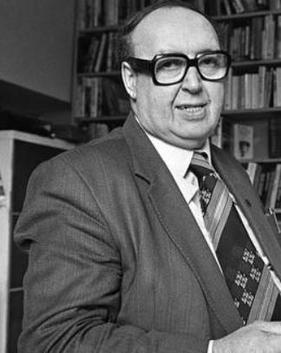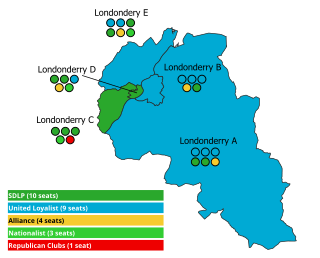The Social Democratic and Labour Party (SDLP) is a social-democratic and Irish nationalist political party in Northern Ireland. The SDLP currently has eight members in the Northern Ireland Assembly (MLAs) and two Members of Parliament (MPs) in the House of Commons of the United Kingdom.

Joseph Austin Currie was an Irish politician who served as a Minister of State for Justice with responsibility for Children's Rights from 1994 to 1997. He served as a Teachta Dála (TD) for the Dublin West constituency from 1989 to 2002, representing Fine Gael, and as a Member of the Parliament of Northern Ireland (MP) for East Tyrone from 1964 to 1972, representing the Nationalist Party and later the Social Democratic and Labour Party (SDLP).

Mark Durkan is a retired Irish nationalist politician from Northern Ireland. Durkan was the deputy First Minister of Northern Ireland from November 2001 to October 2002, and the Leader of the Social Democratic and Labour Party (SDLP) from 2001 to 2010. He contested the Dublin constituency for Fine Gael at the 2019 European Parliament election.

Edward Kevin McGrady was an Irish nationalist politician of the Social Democratic and Labour Party (SDLP), who was the Member of Parliament (MP) for South Down from 1987 to 2010.
The Sunningdale Agreement was an attempt to establish a power-sharing Northern Ireland Executive and a cross-border Council of Ireland. The agreement was signed at Northcote House in Sunningdale Park, located in Sunningdale, Berkshire, on 9 December 1973. Unionist opposition, violence and general strike caused the collapse of the agreement in May 1974.

James Frederick Nicholson is a Northern Irish Ulster Unionist Party (UUP) politician, who served as a Member of the European Parliament (MEP) for Northern Ireland from 1989 to 2019.

Belfast South is a parliamentary constituency in the United Kingdom House of Commons. The current MP is Claire Hanna of the SDLP.

The Northern Ireland Labour Party (NILP) was a political party in Northern Ireland which operated from 1924 until 1987.
Labour – Federation of Labour Groups is the formally registered name of a collection of political organisations in Northern Ireland who aspire to become part of the Labour Party of Great Britain.

Patrick Joseph "Paddy" Devlin was an Irish socialist, labour and civil rights activist and writer. He was a founding member of the Social Democratic and Labour Party (SDLP), a former Stormont MP, and a member of the 1974 Power Sharing Executive.
Ivan Averill Cooper was an Irish politician from Northern Ireland. He was a member of the Parliament of Northern Ireland and a founding member of the SDLP. He is best known for leading the anti-internment march on 30 January 1972 that developed into the Bloody Sunday massacre in Derry, Northern Ireland.
The Irish Independence Party (IIP) was a nationalist political party in Northern Ireland, founded in October 1977 by Frank McManus and Fergus McAteer. The party was effectively a merger of Unity and the Nationalist Party, as the bulk of activists and councillors from the two movements joined IIP. However several independent councillors also joined the party. It was boosted in the late 1970s by the defection of a prominent Protestant Larne Social Democratic and Labour Party (SDLP) councillor, John Turnley, later the party chairman, who was killed in 1980 in Carnlough, County Antrim, by an attack claimed by the Ulster Defence Association.
The Irish Anti-Partition League (APL) was a political organisation based in Northern Ireland which campaigned for a united Ireland from 1945 to 1958.

The Belfast South by-election was held on 4 March 1982 following the death of Robert Bradford, Ulster Unionist Party (UUP) Member of Parliament for Belfast South.
The Nationalist Party was the continuation of the Irish Parliamentary Party (IPP), and was formed after the partition of Ireland, by the Northern Ireland-based members of the IPP.
Denis Haughey is a former Irish nationalist politician in Northern Ireland.
Conall McDevitt is an Irish nationalist, and former member of the SDLP. He also served as the Social Democratic and Labour Party (SDLP) spokesman on Health, Social Services and Public safety and Policing, and was appointed to the Policing Board in May 2011.
National Unity was an Irish nationalist political study group in Northern Ireland.
The Labour Party in Northern Ireland is the UK Labour Party's regional constituency organisation that operates in Northern Ireland. The Labour Party is not a registered political party in Northern Ireland and does not currently contest elections.

The 1973 Londonderry City Council election took place on 30 May 1973 to elect members of Londonderry City Council in Northern Ireland. This was on the same day as other Northern Irish local elections. The campaign was significant in that, following changes to the election process and districts, Irish nationalist parties were able to take control of the council for the first time.









